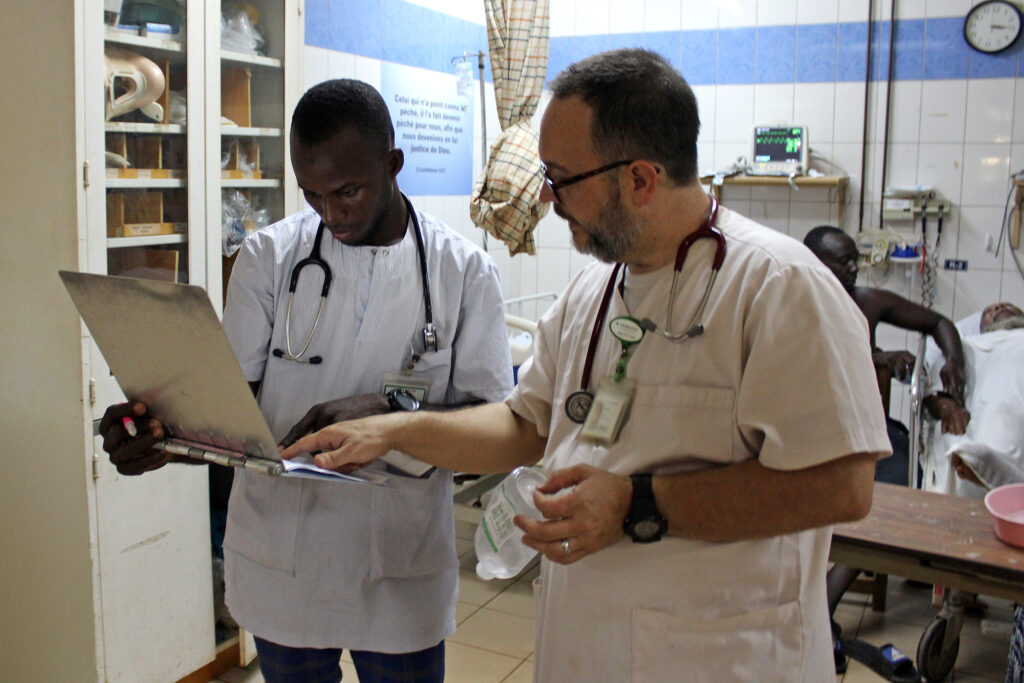“For those in Christ, absolutely none.”
My wife and I are talking with a young man who is visiting a church plant in southern Japan. He is smart, skilled, and savvy. He also needs Christ. Our conversation has just shifted from how he wants to improve himself to his concern that he doesn’t stack up to others he knows. The joy his abilities bring him has had diminishing returns—the more he improves, the more he sees his limitations, and the smaller his joy becomes. His doubt and self-condemnation have only grown.
He droops his head back over his open Bible, eyes scanning the words of Romans 8:1: “There is therefore now no condemnation for those who are in Christ Jesus.” Although, since he is reading it in Japanese, the sentence ends with, “Absolutely none.”
A stillness hangs in the air as tears fill his eyes. Here, at last, we see his heart—a heart that clings to false gospels of self-justification and worth in the eyes of others. A heart that recognizes beauty in creation but does not recognize it as the glory of the Lord.
A heart that has had absolutely no opportunity to hear this good news outside the influence of this church plant.
—
My son, unlike myself, has not developed a resistance to wonder. He bursts at the seams to tell everyone that he turned three last month. I can’t remember how old I’ll be without a little bit of effort. He constantly says, “This is the best [insert anything here] ever!” I’m always thinking, “Well, that could have been better.”
He still demands that we read the Big Picture Story Bible at each meal. He asks us to read one more chapter, and then another, and then another. He still shouts out “Unto you!” when we read the proclamation of Jesus’ birth.
For me, reading the Bible feels like harder work than anything else I do. Too many other tasks clamor in my ears. Too many concepts are calcified in my brain. Too many worries dwell in my heart.
Has the good news lost its goodness because I’ve heard it too many times? Absolutely not.
But I, unlike my son, have grown too familiar with it.
—
To say that our young friend in Japan had no other opportunity to hear the gospel might be overstating things. As the world grows smaller, it is possible that he might hear the gospel elsewhere. Yet he has grown up in a small Japanese town of 50,000 people, and this is the only gospel-preaching church for an hour in any direction.
“Unreached” means just that: not reached with the gospel. The law has gone forth out of Zion and the word of the Lord from Jerusalem, but the good news of Christ has not filled every crack and crevice of creation.
This may be hard for us to grasp. If you are reading this, you have probably heard the words “Lord,” “sin,” “Jesus,” and “repent” defined in biblical terms. They may even be overly familiar to you, like the road signs that your eyes gloss over while driving.
The world, while more connected than in the past, is no less in need of the gospel. There are tribes and tongues that are not reached—the biblical concepts translated “Lord,” “sin,” “Jesus,” and “repent” in English have never been heard, spoken, or even conceptualized in those languages.
There is also the technical definition of “unreached”: “a people group among which there is no indigenous community of believing Christians with adequate numbers and resources to evangelize this people group without outside assistance.”1 By this definition, over three billion people are part of an unreached people group. Many of those groups have millions or tens of millions of people. The largest two, Bengali Muslims and Japanese, have over 100 million.
Is there any hope for them outside of Christ?
Absolutely none.
—
A child’s joy in contagious. I want my son to experience new things, to delight in new days, and to see new beauty in places he never expects it. I want him to experience this wonder not only because I care for him, but because joy is relit in my own heart when it is first lit in his.
And so it was with our young Japanese friend. As the beauty and goodness of the gospel filled his eyes, I saw it afresh.
“Unto you”—Yes, you!—“is born a Savior.” A Savior with absolutely no condemnation for his people. A Savior with absolutely no rival. A Savior with absolute beauty, absolute peace, and absolute salvation.
In that moment, I grasped the joy of holding forth Christ’s gospel to the unreached. They are not burdened, as I am, by a culture that has reduced the beauty of the gospel to a tired concept, the salvation of the gospel to slogans shouted at our enemies, or the peace of the gospel to meaningless mantras repeated to soothe our consciences. The gospel is new to them, and we, the church sent out into their midst, are a strange novelty.
Unreached people groups remain scattered throughout the globe, and the good news that was preached to us urges us to proclaim it to them. And as we do, we find joy and beauty anew through the wonder of a soul encountering Christ for the first time. As Christ draws hearts to himself, our own hearts are softened by beholding the Savior.
We must continue the work Isaiah spoke of: “How beautiful on the mountains are the feet of those who bring good news, who proclaim peace, who bring good tidings, who proclaim salvation, who say to Zion, ‘Your God reigns!’” (Isaiah 52:7).
And in our sending and our going to the unreached, we will find absolutely no regrets in the mission of our Savior.
1. Joshua Project, https://joshuaproject.net/help/definitions.






